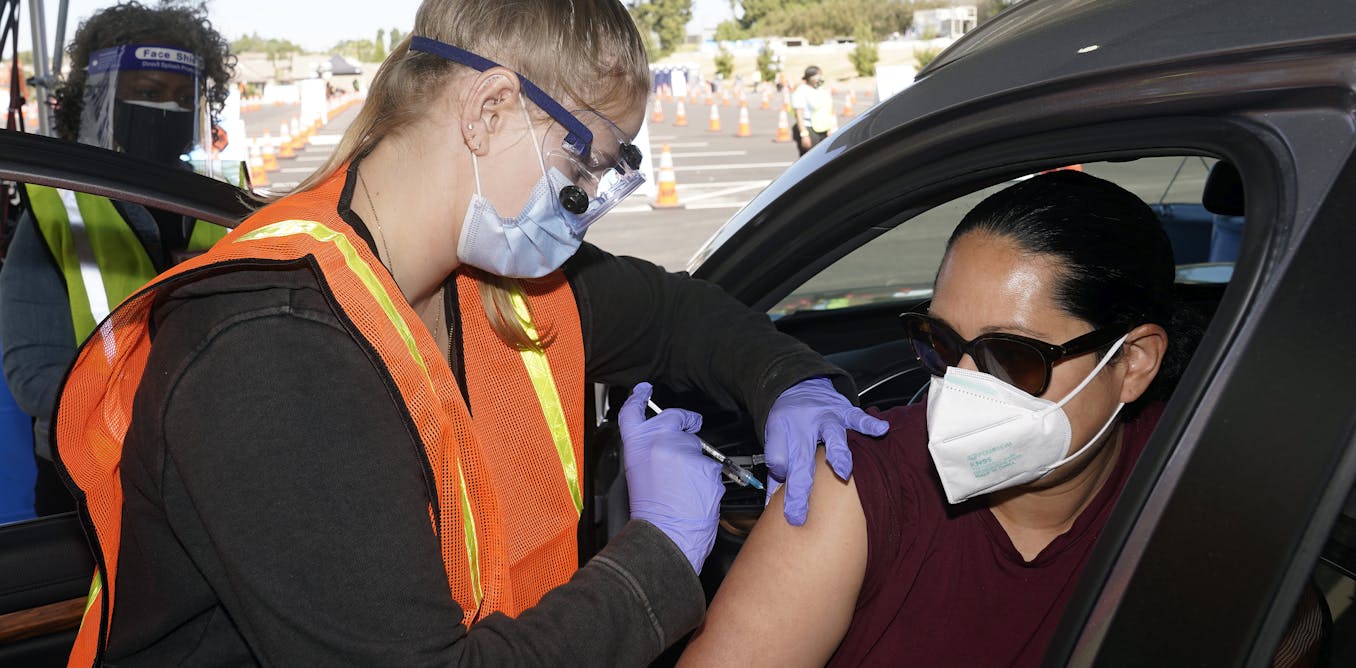The present COVID-19 wave within the U.S. is most commonly affecting unvaccinated American citizens, who constitute greater than 95% of present instances of hospitalization and loss of life.
Given the typical price of a COVID-19 hospitalization in 2020 ran about US$42,200 in step with affected person, will the unvaccinated be requested to endure extra of the price of remedy, relating to insurance coverage, as neatly?
We requested economists Kosali Simon and Sharon Tennyson to give an explanation for the foundations governing how fitness and existence insurers can discriminate amongst shoppers in response to vaccination standing and different health-related causes.
Contents
1. Can insurers fee the unvaccinated extra?
It is a in reality fascinating query and depends upon the kind of insurance coverage.
Lifestyles insurance coverage agencies have the liberty to fee other premiums in response to threat components that are expecting mortality. Buying a existence insurance plans ceaselessly includes a fitness standing take a look at or clinical examination, and requesting vaccination standing isn’t banned.
Well being insurers are a distinct tale. A slew of state and federal laws within the final 3 many years have closely limited their skill to make use of fitness components in issuing or pricing polices. In 1996, the Well being Insurance coverage Portability and Duty Act started prohibiting the usage of fitness standing in any workforce medical health insurance coverage. And the Inexpensive Care Act, handed in 2014, prevents insurers from pricing plans in line with fitness – with one exception: smoking standing.
Fortune just lately reported that whilst a number of of the most important U.S. existence insurance coverage agencies aren’t but asking shoppers for his or her vaccination standing, a couple of insurers instructed the mag they’re doing so for other people at excessive threat. It wasn’t transparent from the item whether or not that is affecting premiums.
A contemporary learn about evaluating existence insurance coverage insurance policies from 2014 via February 2021 discovered that premiums and protection didn’t exchange so much all over the pandemic. The learn about did to find some proof that coverage phrases for the oldest people and the ones with high-risk fitness prerequisites did aggravate.
The authors of the learn about instructed that the fast construction of vaccines is also why existence insurance coverage markets haven’t but proven a dramatic reaction to COVID-19, however their paintings does no longer distinguish the vaccinated from the unvaccinated.
It’s essential to notice that it doesn’t matter what, premiums and protection on present existence insurance coverage gained’t exchange, so a loss of life because of COVID-19 will unquestionably be lined. Typically, denial of existence insurance coverage claims is uncommon and happens just for particular documented causes.
In existence insurance coverage, people who smoke unquestionably pay greater premiums, as do people who find themselves overweight.
ValuePenguin, a unit of LendingTree that gives analysis and research, discovered that people who smoke normally pay over thrice extra for existence insurance coverage than non-smokers.
The web page additionally discovered that weight problems will increase premiums through about 150% – or extra if the individual additionally has clinical prerequisites related to being obese.
As for medical health insurance pricing, the Inexpensive Care Act permits insurers to extend premiums through as much as 50% for people who smoke. The adaptation between what people who smoke and non-smokers pay might in fact be greater for the reason that former can’t use a key executive subsidy to pay for the smoker surcharge.
The ACA makes no identical exception for weight problems.
4. How about reductions for the vaccinated?
There’s a instrument fitness insurers – together with self-insured employers – must decrease premiums to those that are vaccinated: wellness incentives.
Simply as insurers and firms be offering reductions for such things as seeking to drop some weight or forestall smoking, they’re additionally accepted to scale back the medical health insurance premiums that vaccinated workers pay.
In 2019, the typical most incentive introduced through employers for employees to take part in wellness actions used to be $783 in step with 12 months.
Some employers are already incentivizing COVID-19 vaccinations this manner. As an example, Missouri State College gives a $20-a-month cut price on medical health insurance premiums for workers who were given a COVID-19 jab. Others are taking into consideration identical reductions.
And so, despite the fact that insurers can’t fee the unvaccinated greater premiums, individuals who refuse to get a shot can finally end up paying greater than their vaccinated colleagues.
5. Do insurers believe different vaccine or flu pictures in charges?
To the most productive of our wisdom, insurers haven’t in particular used vaccination standing or getting a flu shot in environment premiums.
As a part of getting access to your clinical data, existence insurers would possibly get to grasp whether or not you gained vaccinations, however there are not any methods in position to ensure each and every 12 months whether or not you were given your flu shot. Well being insurers can’t ask about vaccine standing for the explanations indexed above.
Employers can be offering incentives to get a flu shot via their wellness techniques.
[Like what you’ve read? Want more? Sign up for The Conversation’s daily newsletter.]
Supply By means of https://theconversation.com/can-health-insurance-companies-charge-the-unvaccinated-higher-premiums-what-about-life-insurers-5-questions-answered-165959




